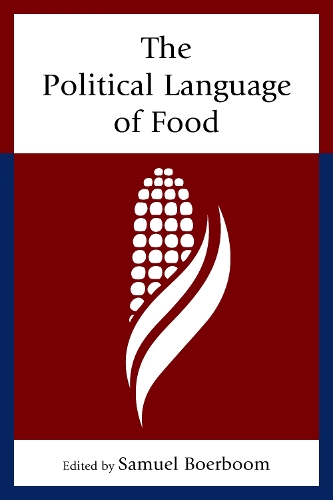
The Political Language of Food
(Paperback)
Available Formats
Publishing Details
The Political Language of Food
By (Author) Joe Abisaid
Contributions by Jennifer Adams
Contributions by Melissa Boehm
Contributions by Samuel Boerboom
Edited by Samuel Boerboom
Contributions by Kathy Brady
Contributions by Cristin A. Compton
Contributions by Leda Cooks
Contributions by Ellen Gorsevski
Contributions by Casey Ryan Kelly
Bloomsbury Publishing PLC
Lexington Books
14th April 2017
United States
Classifications
Professional and Scholarly
Non Fiction
Semantics, discourse analysis, stylistics
Cultural studies: food and society
302.2
Physical Properties
Paperback
282
Width 154mm, Height 233mm, Spine 21mm
435g
Description
The Political Language of Food addresses why the language used in the production, marketing, selling, and consumption of food is inherently political. Food language is rarely neutral and is often strategically vague, which tends to serve the interests of powerful entities.Boerboom and his contributors critique the language of food-based messages and examine how such languageincluding idioms, tropes, euphemisms, invented terms, etc.serves to both mislead and obscure relationships between food and the resulting community, health, labor, and environmental impacts. Employing diverse methodologies, the contributors examine on a micro-level the textual and rhetorical elements of food-based language itself. The Political Language of Food is both timely and important and will appeal to scholars of media studies, political communication, and rhetoric.
Reviews
This collection of 12 essays focuses on the political contexts of producing, marketing, selling, and consuming food, as well as producing 'food language.' Each author approaches a major food-based issue, such as vegetarianism, obesity, or organic foods, by analyzing and deconstructing the language of food as the basis for his or her research methodology. Essays are organized into four sections: 'The Language of Food-Based Social Movements,' 'Food Language and Social Class,' 'The Language of Food Labeling,' and 'Critiques of Corporate Bureaucratic Language.' All contributors are communications, media, or rhetoric professors; though authors from a narrow range of disciplines may support the editors thematic emphasis, their homogeneity may prove a weakness when they write about the interdisciplinary field of food studies. . . .Readers will enjoy the provocative essay 'Exoticizing Poverty in Bizarre Foods America.' This anthology can serve classes in sociology, anthropology, geography, marketing, communications, and food studies. For university libraries or large public libraries. Summing Up: Highly recommended. Upper-division undergraduates, graduate students, researchers/faculty, and professionals/practitioners. * CHOICE *
This book is extremely clear and will prove helpful for people interested in any subject relating to the (political) language involving food. It would work well for a classroom setting because it covers so many different perspectives. It is great for people to know about the discrepancies involving the food industry, with examples and individual stories. I recommend this book to anyone who is looking for new perspectives on this concept. * Communication Research Trends *
The Political Language of Food delights readers with a bountiful harvest of perspectives, theories, and problematics. No doubt, it will be mandatory reading for those interested in the intersection of food and language. -- Justin Eckstein, Pacific Lutheran University
The Political Language of Foodis a comprehensive collection of essays, with a variety of foci and approaches, which allreinforce the central tenet that if we truly want to understand how food functions politically, socially, culturally, and materially, we must begin byexamining the murky depths of language, by dissecting the very words that we use to discuss it, and by interrogating the key meanings surrounding it -- Carlnita P. Greene, University of Oregon, author of Gourmands and Gluttons: The Rhetoric of Food Excess
Emphasizing the political nature of food marketing and consumption, as well as the rhetorical construction of food language, The Political Language of Foodoffers a multitude of methodological approaches to topics such as back-to-the-land food movements, culinary slumming, and the greenwashing of food discourse. -- Laura K. Hahn, Humboldt State University
Author Bio
Samuel Boerboom is assistant professor of media studies in the Department of Communication and Theatre at Montana State University Billings.
